
The Basilica di Santa Maria Gloriosa dei Frari, usually just called the Frari, is a church located in the Campo dei Frari at the heart of the San Polo district of Venice, Italy. The largest church in the city, it has the status of a minor basilica. The church is dedicated to the Assumption of Mary.
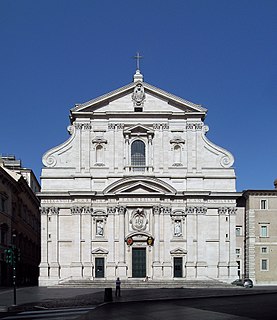
The Church of the Gesù is the mother church of the Society of Jesus (Jesuits), a Catholic religious order. Officially named Chiesa del Santissimo Nome di Gesù all'Argentina, its facade is "the first truly baroque façade", introducing the baroque style into architecture. The church served as a model for innumerable Jesuit churches all over the world, especially in the Americas. Its paintings in the nave, crossing, and side chapels became models for Jesuit churches throughout Italy and Europe, as well as those of other orders. The Church of the Gesù is located in the Piazza del Gesù in Rome.
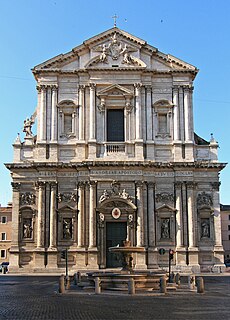
Sant'Andrea della Valle is a minor basilica in the rione of Sant'Eustachio of the city of Rome, Italy. The basilica is the general seat for the religious order of the Theatines. It is located at Piazza Vidoni, 6 at the intersection of Corso Vittorio Emanuele and Corso Rinascimento.

San Carlo ai Catinari, also called Santi Biagio e Carlo ai Catinari is an early-Baroque style church in Rome, Italy. It is located on Piazza Benedetto Cairoli, 117 just off the corner of Via Arenula and Via dei Falegnami, a few blocks south of the church of Sant'Andrea della Valle.

St. George's Basilica or the Basilica and Collegiate Parish Church of Saint George, also simply known as San Ġorġ in Maltese, is a historic Baroque church situated in the middle of Gozo, the second largest island in the Maltese archipelago, and is surrounded by a maze of old narrow streets and alleys. Today's basilica was built between 1672 and 1678.

San Francesco della Vigna is a Roman Catholic church in the Sestiere of Castello in Venice, northern Italy.

The Madonna dell'Orto is a church in Venice, Italy, in the sestiere of Cannaregio.
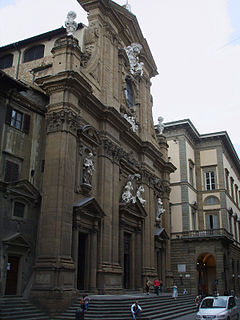
San Gaetano, also known as Santi Michele e Gaetano, is a Baroque church in Florence, Italy, located on the Piazza Antinori.

San Bernardino is a church in Verona, northern Italy. The church, in Gothic style, was built from 1451 to 1466.

The Church of San Marco in San Girolamo is a baroque parish church in Vicenza, northern Italy, built in the 18th century by the Discalced Carmelites. It houses various artworks by artists of the early 18th century from Veneto. The sacristy preserves its original furniture of the same period.

The Piccolomini Altarpiece is an architectural and sculptural altarpiece in the left-nave of Siena Cathedral, commissioned by cardinal Francesco Todeschini Piccolomini who expected it to become his tomb. However, he was elected Pope Pius III and buried in the Vatican. It was built between 1481 and 1485 by Andrea Bregno in Carrara marble, with additions in the following decades – these included four niche sculptures produced between 1501 and 1504 by Michelangelo of saints Peter, Augustine, Paul and Gregory. On top of the altar is the Madonna and Child, a sculpture (probably) by Jacopo della Quercia. The central painting of the Madonna is by Paolo di Giovanni Fei and from the late 14th century.

The Abbey of Santa Giustina is a 10th-century Benedictine abbey complex located in front of the Prato della Valle in central Padua, region of Veneto, Italy. Adjacent to the former monastery is the basilica church of Santa Giustina, initially built in the 6th century, but whose present form derives from a 17th-century reconstruction.

Volterra Cathedral is a Roman Catholic cathedral in Volterra, Italy, dedicated to the Assumption of the Virgin Mary. It is the seat of the bishop of Volterra.
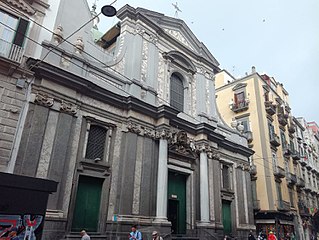
The church of St. Nicholas the Charitable is a church located on via Toledo, almost midway between Piazza Carità and Piazza Dante in Naples, Italy.

The Church of St James is a Roman Catholic church building in Victoria, Gozo, Malta, situated in Independence Square, the centre of the town.
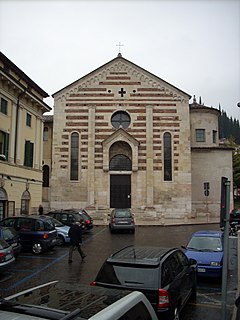
Santo Stefano is a Paleo-Christian, Roman Catholic basilica church in central Verona, region of Veneto, Italy.

The Sizun Parish close is located at Sizun in the arrondissement of Morlaix in Brittany in north-western France. The "enclos paroissial" or parish close comprises the Église Saint-Suliau, a sacristy, an ossuary or funeral chapel and a "porte triomphale" giving access to the enclosure. The enclosure is a listed historical monument since 1943.

The Church of St Bartholomew is a Roman Catholic Parish church in the village of Għargħur, Malta.
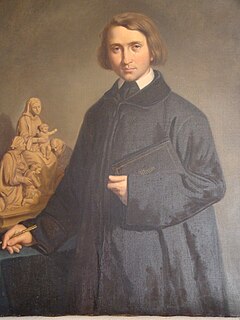
Jean-Marie Valentin, was born at Bourg-des-Comptes in Ille-et-Vilaine on 17 October 1823 and died in Paris on 8 August 1896. He was an architect and a sculptor specialising in religious furnishings such as pulpits, altars and statues. His father Antoine Louis Valentin was a master carpenter working mostly in ebony. He was born in 1784. Jean-Marie first worked at his father's workshop.

Francesco Vincenzo Zahra was a Maltese painter who mainly painted religious works in the Neapolitan Baroque style. His works may be found in many churches around the Maltese Islands, as well as in some private collections and museums. He is considered to be the greatest painter from 18th-century Malta.





















